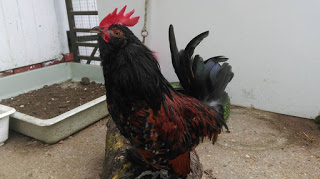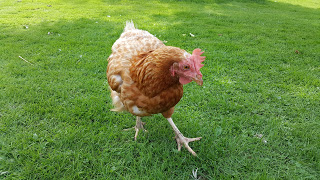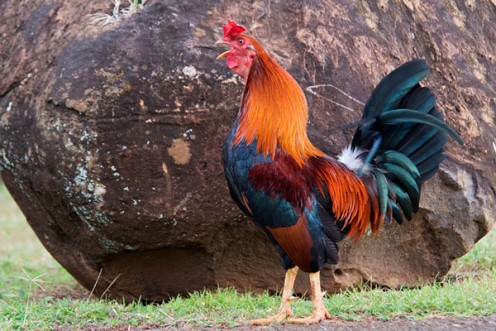Getting Henpecked
Matriarch chickens can be testing even for a cockerel.
Dusty the Bantam Rooster

Keeping Chickens
Chickens are great little creatures to look after in one’s garden. Of course, you will need a garden with a fair amount of space for a chicken coop. I say this because I decided to be all liberal and let the chickens wander about at first. I had made a fenced area with a hutch, but I thought by leaving the coop gate open they could wander about to their heart’s content. The garden is sealed off and they could not gain access to the side of the house or past the gate into the street. When dusk came, the chickens instinctively wandered back to the hutch and settled down, waiting for my wife or me to bolt the door. We do have foxes, stoats and weasels. Our hamlet is very rural and farm fields are on the opposite side of the road. Fortunately, we have not had predatory wildlife trying to get at our chickens. They lay eggs each day and neighbours often call for some too. We also have three ducks and do the same thing. The eggs are regular. Of course, they become a little more haphazard during winter moult as my wife calls it.
Where Problems Occurred
We decided to stop the practice of letting them wander the garden because they eat everything. You don’t get any slugs. That was great. However, all my cornflowers vanished and so did many other plants when the spring came. Our garden flower beds looked great in spring and summer before. Then in autumn, we decided it would be fine to let the poultry do a bit of free range wandering. All the flowers die off in the winter. Let the chickens roam.
Red Mite
Chickie the runt of the hens.

Problems I Did Not See Coming
- Eating the plants
- Bumblefoot
- Red Mite
- Feather pecking (matriarch bully)
The First Problems
Well, the next summer was rather Spartan on the flower front. The chickens and the ducks ate almost everything before many of our plants could germinate. The effect looked bad. The surviving plants that did grow looked sparse and scattered. We had to go to the nurseries and buy new perennials to replace those eaten by the chickens and ducks. We also decided to keep them within the confines of the large chicken coop. This worked for a short time. We had one chicken with bumblefoot. This my wife cured with a magnesium compound and foot dressing. We also had Red Mite. We had to douse the chickens with special Red Mite powder. The chicken hutch thoroughly disinfected every week with Jeyes fluid.
The Matriarch (The Final Problem)
Chickens are rather social creatures in a group. But hens are obviously all female. They squabble and bicker among themselves and a dominant hen will always rise to recognition among the others. Our matriarch chicken is called Tippy. She started to call the shots. The others hens would dutifully follow their matriarch’s example. What she disliked, every chicken disliked.
The chickens and the ducks seemed to get by fine. However, with our three ducks was an old drake called Polo. I put him in the past tense because the old lad has passed away since. But at the time I speak of, he still had a couple of years to go. This old drake was not liked by Tippy. After a time her aversion developed to a stage whereby she started to peck the old boy. Of course, all of the hens joined in. I had to create a new coop for the ducks because Polo was getting extremely traumatised. I put a wire fence between the chickens and ducks. This worked and old Polo settled down.
Next Tippy began to take a dislike to one of her hens in the group. This little hen was named Chickie. I had another old chicken hutch in by my garden shed. Therefore I segregated Chickie and put her here on her own. I had three ducks in a section of the coop and five chickens in the other section. Then there was Chickie walking about the garden when we let her out of the spare chicken hutch.
What About a Cockerel?
My wife and I began to ponder the problem. I suggested a cockerel. A cockerel would calm the hens down and he would also put the matriarch in her place. My wife was concerned that the cockerel would do its thing of cockle doodle do in the morning, every morning and much to the annoyance of the neighbours. There is a law in urban areas about keeping cockerels. However, our house is almost rural. Our street has the fenland on the other side of the road and the next town is fifteen plus miles away. There is nothing but fields to the next town. However, we are in a small town, even if my street is the last road in the town.
I wanted a cockerel and was prepared to take a chance with the neighbours. I often heard other cockerels in town too. I work in the next town of Chatteris. I hear a cockerel here every morning too. The Fenlands is, by far rural, and most people in the small English hamlets don’t take much notice of this type of thing. I tried to explain this to my wife. She half agreed but there remained some doubt.
The breed of chickens we keep is called Rhode Island Reds. When I bought them there was a cockerel Rhode Island Red at the farm. He looked absolutely resplendent as he strutted about the place. He was a big old lad. Again, my wife said that he would make too much noise. She knows more than me on the subject. I come from London’s east end. The district of Bow. I don’t know much about this type of thing. My wife came from Burnham-on-Crouch. She has had chickens as a child. She remembers her Grandmother having to use a chair to get the eggs in the coop because the cockerel would get a little aggressive and protective of the hens.
I dropped the idea of a cockerel and Chickie wandered the garden on her own. She did not seem to eat the new flowers and laid her egg in the hutch mostly. Sometimes under a Lilly plant. She did not seem to care about being excommunicated from the other hens. She had more space.
The little cockerel with small man syndrome
Then one day my wife and I decided to pay a visit to an animal sanctuary that is close to our town. It is in Godmanchester, Cambridgeshire. We had seen a man at the supermarket entrance. He was collecting donations for the Sanctuary. We gave him a small donation and he gave us the leaflets and asked us to pay a visit to the place. We did. There were all sorts of rescued animals there and the complex was very big. There was one place for chickens and among the many abodes were cockerels. Some were huge. But there was also a very small Bantam cockerel. He was among Rhode Island Red hens. I asked how this small cockerel was among the large Rhode Island hens. They looked like Amazons next to an underdeveloped and wimpy little man.
The lady laughed and said, “He stands his ground and the hens seem to respect him.’ The Sanctuary was looking for a decent home for him to stay at. My wife and I began to tell the lady the story of our matriarch hen and how she had caused a few problems. We all agreed that Dusty the cockerel might be the answer to the problem. His "cockle doodle do," was not that loud either. At least I decided it was not. My wife also seemed to think it might work. We agreed to take Dusty the little Bantam cockerel and give him a trial.
I thought he looked great. The black feathers around his feet looked like flash bell-bottom trousers. We did all the paperwork stuff and the people of the sanctuary came out and checked the coop. All was fine. Dusty came to our house and we decided to introduce him to Chickie first. She was the hen that had suffered the matriarch’s bullying. The runt of the batch. I thought it was better to break the lad in slowly. First Chickie and then after an interval of a day or two, into the coop, sort out the matriarch named Tippy. Job done! Chickie can move back in and Dusty would run a fair and proper house. A cockerel with small man syndrome and his harem of hens.
All cockle and no doo.
To say Dusty was a let down would be putting it mildly. I brought him into the garden and put him on the lawn. Chickie was in a flower bed and we watched as Dusty bowled over in his resplendent bell-bottom chaps. I got out my mobile and decided to capture the moment of introduction. I thought, "Today Chickie and then the coop where the matriarch would be put in her place."
Dustry struts his stuff.
Dusty was bashed up by the henpecked Chickie. I had a fair idea of what would happen if he was put in the coop. Tippy might start and all the others would join in. I reasoned that the birds might prefer an alpha male to a pygmy Bantam. I think Dusty would have got more than he bargained for in the coop.
There were other Roosters at the sanctuary. But before Dusty returned we had him for a few days. He liked to cockle doodle doo. I did not think it sounded that bad, but my wife did. When we took him back a few days later, I wanted a bigger one but I gave into my wife's concern. Maybe another time.
A Road Island Red Cockerel.

The Man for the Job
If I can persuade my wife to have a cockerel. It will have to be a Rhode Island Red. I've seen several for sale. These are where I work during the day. I've been thinking about it for a while. Maybe I'll take a chance and bring one back. Then we could acquire a few more hens knowing the cockerel will keep a good house and stop the in-fighting.
The Chicken Quiz
Question 1/3
Roughly how many eggs does a Rhode Island hen lay each year?






